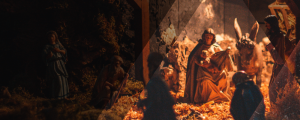In Genesis 3, we read about the Fall, the Rebellion of Adam and Eve against God. It’s a sobering passage of Scripture, and it’s vital for us to understand if we want to understand the world we live in, the rest of the Bible, and the good news of Jesus. In this passage, we see what sin is and what sin does. Sin is a failure to trust and obey God’s Word. It’s rebellion against God’s good authority. Sin has shattered our relationship with God.
Sin is a Failure to Trust and Obey God’s Perfect Word
First, we need to recognize that sin is a failure to trust and obey God’s perfect Word. In Genesis 3, the serpent enters the Garden as a tempter, questioning God’s Word and purposefully misquoting it: “Did God really say you shall not eat of any tree in the garden?” This is not an innocent question. It is a question that intentionally casts shade on the Word of God. It was intended to sow seeds of doubt that God’s Word isn’t perfect and good.
Eve responds by trying to correct the Serpent. But her quotation of God’s Word is slightly off. First, she seems to downplay God’s provision of every tree in the Garden (compare Genesis 2:15 and 3:2). She also adds to God’s command and downplays slightly God’s Word of judgment (compare Genesis 2:16 and 3:3). She passes quickly over the promise, and then she adds to the prohibition, even while softening God’s Word of judgment. What she’s doing is beginning to play the serpent’s game.
Eve’s example is meant to be a warning to us. At times, failing to trust God’s Word begins simply with failing to know God’s Word accurately. Problems arise when we come to God’s Word, and we downplay the good promises of God. We add to His commands and we soften His judgment. Satan wants us to have a fuzzy and inaccurate knowledge of the Bible. Even if it’s very small, it opens the door to more danger.
We need to know God’s Word accurately because it is our life. The serpent will come at us, and if we don’t know God’s Word, we won’t be able to fend him off. Our life depends on understanding and believing God’s Word. We should never become content with a fuzzy knowledge of the Bible. We need to read it, study it, believe it, and live it.
By the end of his conversation with Eve, the serpent comes out and simply denies God’s Word: “You won’t surely die.” He calls God a liar. Satan attacks the Word of God. He never actually tells Eve to eat the fruit. But he doesn’t have to. He attacks her faith in God’s Word. Once Eve’s trust in God and His Word crumbles, the act of sin just follows.
At the heart of all sin is unbelief—a failure to believe that what God says is true. Whenever you sin, you can trace it back to unbelief in the Word of God. When you tell a lie, you’re failing to believe what God says about the truth. When you insult someone, you fail to trust God’s Word about loving your neighbor as yourself. When you covet something, you fail to trust that what God has given you is enough. From the very beginning in the garden we see that sin is failure to trust God’s Word.
Sin is Rebellion Against God’s Good Authority
Second, we should see that sin is rebellion against God’s good authority. The serpent not only tries to cause unbelief, he casts doubt on who God is—God’s character. His opening question is clearly intended to cause Eve to consider whether God is really good: God won’t let you eat from any of these trees? What kind of God is he?
The serpent also lies about the reason God gave the command. He tells Eve that God doesn’t want them to eat the forbidden fruit because he doesn’t want humanity to be like Him. He essentially tells her: God and His authority are not good. He doesn’t have your best interests in mind. His authority is meant to oppress you, to withhold good things from you. He attacks what Eve believes about God in her heart. He wanted her and wants us to have bad theology, to deny the good authority of God.
In her heart, Eve believes the lie about God. She looks at the fruit and believes that it will make her wise like God. She takes the fruit and she eats it. She rebels against God and His Word. What she is doing is trying to take God’s place. She’s trying to be God herself by determining and declaring what is good and what is evil. That is what the tree of the knowledge of good and evil was all about.
The seemingly “small” action of eating the fruit was treason against their good Creator. It shows us that every sin is an act of rebellion against God. Sin is not merely a mistake or an accident. It is high treason against our Creator, the God who made us in His image. It is rebellion against His good authority. It is a revolt against His goodness.
The Remedy
Therefore, in Adam, all of us are rebels. We doubt God’s goodness and love. This doubt leads us to resist God’s authority and look outside His Word for wisdom. We try to be God. We live by what we think looks right, feels right, and will make us look right.
But the good news is that Jesus overcame temptation. He quoted God’s Word accurately when tempted. He believed it. He obeyed it. He stood firm against the serpent’s temptation and did not taste the forbidden fruit of sin. He tasted death on the cross so that we might be forgiven.
Turn your back on your sin today, and trust in Jesus Christ. Believe and obey God’s Word. Enjoy God’s good authority. Rejoice in the work of Jesus that reconciles us to God.
This bad news about our sin is the black backdrop to the bright light of the gospel of Jesus. We need to understand the bad news so we can embrace the good news of what Jesus has done.
This post was adapted from the sermon below:
Image Credit: ©hidesy on Getty Images Signature via Canva.com







